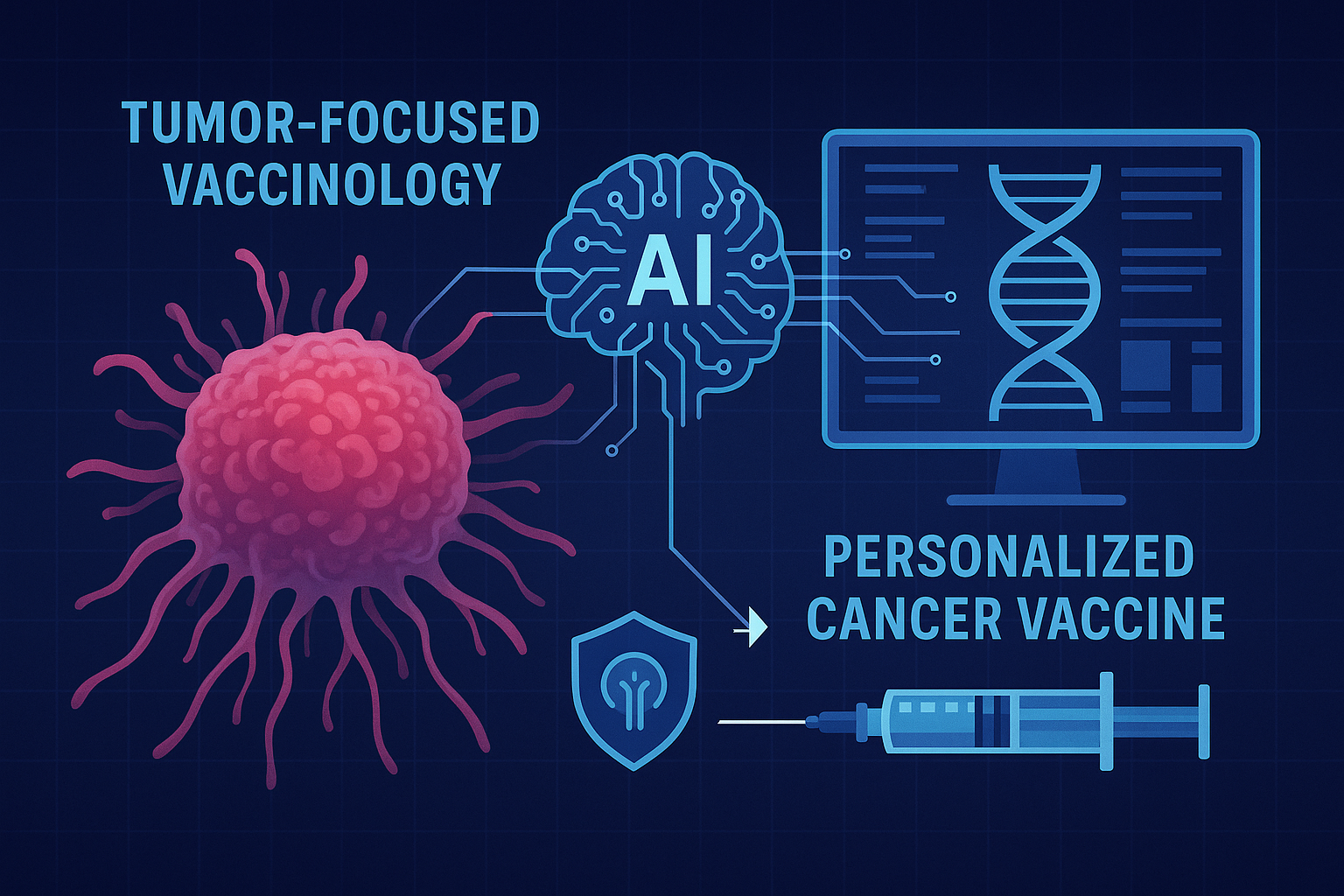
Tumor-Focused Vaccinology: How Artificial Intelligence Is Reshaping Cancer Immunotherapy
- Jul 15, 2025
- 0 Comments
Cancer remains one of the most formidable health challenges of the 21st century, claiming millions of lives annually and placing immense strain on patients, families, and healthcare systems. Yet, in this era of rapid technological advancement, a new weapon is emerging in the war against cancer: artificial intelligence (AI). Far from science fiction, AI is now at the forefront of biomedical innovation, playing a critical role in the design of cancer vaccines that are personalized, precise, and potentially transformative.
This article delves into how AI is revolutionizing tumor-focused vaccinology by analyzing complex biological data to identify neoantigens, design personalized therapies, and accelerate vaccine development. We explore the science, the companies leading the charge, the clinical status of AI-driven cancer vaccines, and the future landscape of algorithm-enhanced oncology.
Understanding the Basics: Cancer Vaccines and Neoantigens
Unlike traditional vaccines that prevent infectious diseases, cancer vaccines are a form of immunotherapy. They aim to stimulate the body’s immune system to recognize and attack cancer cells. One of the most promising approaches involves targeting neoantigens – unique, mutated proteins present only on cancer cells, not healthy tissues. Because they are tumor-specific, neoantigens reduce the risk of harming normal cells, making them ideal for vaccine development.

The challenge? Every patient’s cancer is genetically distinct. This genetic heterogeneity makes it difficult to design a one-size-fits-all vaccine. That’s where AI enters the picture.
The Role of Artificial Intelligence in Tumor-Focused Vaccinology
AI excels at identifying patterns in massive datasets. In oncology, this means analyzing multi-omics data (genomics, transcriptomics, proteomics) to:
- Identify mutations unique to a patient’s tumor
- Predict which mutations produce neoantigens
- Rank neoantigens based on immunogenic potential
- Design vaccine candidates targeting the top-ranked neoantigens
- Optimize vaccine formulation and delivery
This pipeline, which traditionally took months of trial-and-error in the lab, can now be completed in days or weeks using AI-powered platforms. While laboratory validation is still necessary, AI significantly reduces the experimental burden and accelerates discovery.
Evaxion Biotech and the PIONEER Platform
One of the pioneers in this space is Evaxion Biotech, a Danish immuno-oncology company developing personalized cancer vaccines. Their proprietary PIONEER platform integrates advanced machine learning algorithms with genomic analysis to identify patient-specific neoantigens. The system prioritizes peptides based on immunogenicity, manufacturability, and presentation by MHC (Major Histocompatibility Complex) molecules.
PIONEER analyzes tumor biopsy data, predicts relevant neoepitopes, and designs a personalized vaccine in a clinically actionable timeframe. As of 2025, Evaxion has advanced several vaccine candidates into Phase I/II clinical trials, with promising safety and immunogenicity data. Although the article previously claimed a favorable International Preliminary Report on Patentability (IPRP) dated June 26, 2024, no public confirmation of this has been released. Nevertheless, Evaxion’s patent portfolio is robust and growing.
Other Leaders in AI-Driven Cancer Vaccine Development
Evaxion is not alone in this endeavor. Several companies are making significant progress in integrating AI into oncology:
1. BioNTech
Known for its role in developing the Pfizer-BioNTech COVID-19 vaccine, BioNTech is applying similar mRNA technology to oncology. Their iNeST (individualized neoantigen specific immunotherapy) platform uses deep learning to analyze tumor mutations and formulate personalized mRNA vaccines. BioNTech has multiple ongoing trials in collaboration with Genentech/Roche.
2. Gritstone Bio
Gritstone Bio is developing personalized vaccines using its EDGE platform (Epitope Discovery in cancer using Genomics and Epigenomics). It identifies tumor-specific neoantigens and delivers them via viral vectors or mRNA. Their candidates are currently in Phase II trials for non-small cell lung cancer and gastrointestinal cancers.

3. NEC Corporation / Transgene
This collaboration uses NEC’s AI-based Neoantigen Prediction System (NPS) to identify optimal neoantigens, which are then delivered via Transgene’s TG4050 viral vector platform. Early-phase trials show promise in head and neck cancers.
4. Ultimovacs
The article mentions Ultimovacs and its UV1 vaccine, which targets telomerase, a protein overexpressed in about 85% of cancers. While UV1 was not originally developed using AI, the company is exploring computational methods to optimize future iterations and broaden antigen targeting.
Limitations and Challenges
Despite the excitement, several hurdles remain:
- Predictive Accuracy: Not all predicted neoantigens elicit a strong immune response. False positives are common.
- Manufacturing Timelines: Personalized vaccines still take time to synthesize, test, and deliver, despite AI speeding up early steps.
- Cost and Scalability: Personalized vaccines are resource-intensive. Reducing costs while maintaining precision remains a challenge.
- Regulatory Complexity: Each personalized vaccine must meet regulatory standards for safety, efficacy, and reproducibility.
AI cannot yet replace wet-lab validation or clinical trials, but it amplifies the speed and precision of the entire discovery-to-clinic pipeline.
Future Outlook: A Paradigm Shift in Oncology
AI is driving a paradigm shift in therapeutic design:
- From “One-Size-Fits-All” to “Made-for-One”: AI enables hyper-personalized interventions tailored to individual tumor profiles.
- Real-Time Monitoring and Adaptive Vaccines: Future systems may adapt vaccines dynamically as tumors evolve, similar to tracking variants in infectious diseases.
- Integration with Liquid Biopsies: AI-powered analysis of circulating tumor DNA could enable real-time updates to vaccine design.
- Combination Therapies: AI-optimized vaccines may be used in tandem with checkpoint inhibitors, CAR-T cells, or radiation to improve outcomes.
Conclusion: AI as a Force Multiplier in Cancer Care
Cancer is a genomic battlefield, and in this molecular war, AI is no longer a passive observer but an active combatant. It augments the capabilities of scientists, speeds up discovery, and personalizes care in ways that were unimaginable a decade ago.
While we are still in the early stages of AI-driven immunotherapy, the trajectory is clear: algorithmic medicine is here to stay. With continued collaboration between biologists, clinicians, data scientists, and regulators, the dream of a personalized cancer cure may soon become a standard of care. As we look to the future, the cure for cancer may not come solely from petri dishes and clinical trials, but from code, computation, and the careful choreography of biology and artificial intelligence.

